Classic Commentaries and Studies on the Books of Samuel Upgrade (11 vols.)
Digital Logos Edition
Overview
This collection offers some of the most significant classical studies on the books of Samuel from the eighteenth, nineteenth, and twentieth centuries. With notable authors such as George Lawson, George C.M. Douglas, James Davies, and Patrick Simon, the Classic Commentaries and Studies on the Books of Samuel Upgrade contains over 3,000 pages of interpretation, exposition, practical application, and contextual history. These 11 volumes have had an enduring impact on Old Testament exegesis, and this exceptional collection provides easy access to this wealth of significant scholarship.
In Logos, these foundational volumes are enhanced by cutting-edge research tools. Scripture citations link directly to English translations, and important terms link to dictionaries, encyclopedias, and a wealth of other resources in your digital library. Powerful searches help you find exactly what you’re looking for. Tablet and mobile apps let you take the discussion with you. With Logos Bible Software, the most efficient and comprehensive research tools are in one place, so you get the most out of your study.
Want more classic works on the books of Samuel? Check out the Classic Commentaries on the Books of Samuel.

Key Features
- Over 3,000 pages of enduring scholarship on the books of Samuel
- Contributions from a variety of backgrounds
- Both accessible devotionals and academic studies
Product Details
- Title: Classic Commentaries and Studies on the Books of Samuel Upgrade
- Volumes: 11
- Pages: 3,253
- Resource Type: Commentaries
- Topic: Biblical Studies: Historical Books
Individual Titles
- Notes on 1 Samuel by James Davies
- Notes on 2 Samuel by James Davies
- The Books of Samuel by Isaac George Matthews
- First Samuel: Bible Class Notes by Peter J. Pell
- Second Samuel: Bible Class Notes by Peter J. Pell
- From Samuel to Solomon by Charles S. Robinson
- A Commentary upon the Two Books of Samuel by Patrick Simon
- Samuel and His Age: A Study in the Constitutional History of Israel by George C.M. Douglas
- Samuel the Prophet and the Lessons of His Life and Times by Robert Steel
- Discourses on the History of David and on the Introduction of Christianity into Britain by George Lawson
- Lectures on the Life of Samuel: Preached in the Parish of Warminster, Wilts by William Dalby

This reader’s guide provides clear definitions of words and phrases found in 1 Samuel. Easy to navigate, you’ll find quick answers to your questions on this book of biblical history. Arranged according to the biblical text, James Davies avoids minutiae, allowing you to focus on your study.
James Davies was a faculty member at the University of London. He wrote several local examination manuals for books of the Bible, as well as for the Book of Common Prayer and other liturgical texts.

This reader’s guide provides clear definitions of words and phrases found in 2 Samuel. Easy to navigate, you’ll find quick answers to your questions on this book of biblical history. Arranged according to the biblical text, James Davies avoids minutiae, allowing you to focus on your study.
James Davies was a faculty member at the University of London. He wrote several local examination manuals for books of the Bible, as well as for the Book of Common Prayer and other liturgical texts.
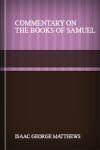
The Books of Samuel
- Author: Isaac George Matthews
- Series: American Commentary on the Old Testament
- Publisher: American Baptist Publication Society
- Publication Date: 1931
- Pages: 164
In this volume, Baptist professor Isaac George Matthews gives his commentary on the King James Version of 1 and 2 Samuel. Matthews writes a moderate historical critical commentary, representative of the early twentieth century. His modern commentary is still relevant today, examining “messianic note” that “runs through the whole of the Old Testament.”
Isaac George Matthews (1871–1959) was a Baptist pastor and professor of Old Testament and systematic theology at McMaster University.

This reading guide from the Gospel Folio Press provides clear summary and analysis of 1 Samuel. Peter J. Pell presents an insightful lesson commentary on the call of Samuel, the anointing of Saul, and the rise of David.
Peter J. Pell was a preacher and publisher, and one of the founders of the Gospel Folio Press.

Second Samuel: Bible Class Notes
- Author: Peter J. Pell
- Series: Bible Class Notes
- Publisher: Gospel Folio Press
- Pages: 255
This reading guide from the Gospel Folio Press provides clear summary and analysis of 2 Samuel. Peter J. Pell presents an insightful lesson commentary on the triumph, temptation, and trials of King David, the man after God’s heart.
Peter J. Pell was a preacher and publisher, and one of the founders of the Gospel Folio Press.
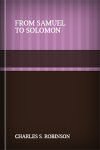
The narratives of 1 and 2 Samuel are some of the most exciting and personal narratives of the Old Testament. In this volume, Presbyterian minister Charles S. Robinson draws out 29 lessons from the two books that follow the lives of Samuel, Saul, David, and Solomon–four leaders “whose lives were so individual and yet in many respects so alike.” According to Robinson, “whoever understands those men will have attained a knowledge of human nature which will prove valuable to him as a citizen and a Christian.”
Charles S. Robinson (1829–1889) was an American pastor and writer. He attended Princeton Theological Seminary and Union Theological Seminary before becoming the pastor of the Park Street Presbyterian Church of Troy, New York. He pastored several other congregations before retiring from ministry in 1887. He published several popular hymnals.
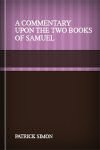
Combining a pious voice with the objective tone of the Age of Reason, this volume presents the critical commentary of Anglican minister Patrick Simon on the books of Samuel. Recognized as some of the most enduring English Bible commentary, Simon’s critical work addresses challenges the church faced during the beginning of the Enlightenment.
Patrick Simon (1626–1707) was an English theologian and the bishop of Chichester (1689–1891) and Ely (1691–1707). He remained rector at St. Paul’s, Covent Garden in London during the Great Plague (1665–1666). He published numerous sermons and devotional pieces, and his Old Testament commentaries were incorporated into A Critical Commentary and Paraphrase on the Old and New Testament and the Apocrypha with the work of William Lowth, Moses Lowman, Richard Arnald, and Daniel Whitby.
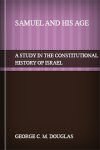
This fascinating volume examines the governmental structure of Israel as it developed in 1 and 2 Samuel. Throughout his analysis of these books, George C.M. Douglas pays particular attention to Samuel, as Israel’s second grandest leader after Moses, analyzing how he stewarded and passed off the three offices of prophet, priest, and supreme ruler through his life and the reigns of Saul and David.
George C.M. Douglas (1826–1904) was educated at the University of Glasgow and at New College in Edinburgh before becoming pastor at Bridge of Weir from 1852–1857. Douglas later became professor of Hebrew at Free Church College in Glasgow, Scotland. Douglas’ familiarity with German, French, and English gave him a wide scope of understanding for his various works.
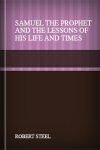
In this study of the character of Samuel, Robert Steel examines how the narratives and characters of the Old Testament, as opposed to the New, present an opportunity to learn from the lives of “men like ourselves,” with “peculiar temptations as well as privileges, and revealed infirmities and well as virtues.” Steel works through the books of Samuel in 24 lessons, from his intriguing calling and the labor of his old age. Drawing out lessons for every-day Christian living, Steel examines the life of Solomon, which touches on “all classes and conditions,” as “one of the brightest examples of holy living and useful labor.”
Robert Steel (1827–1893) was a Presbyterian minister in colonial Australia. He was born in Wales to Scottish parents. He was educated at Aberdeen and Edinburgh universities and earned his PhD from the University of Gottingen. In 1861 he took over the pastorate of Macquarie Street church in Sydney, Australia. He helped establish St. Andrew’s College at the University of Sydney, where he tutored in theology.
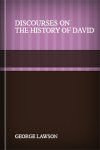
This volume from Presbyterian minister George Lawson includes two works. In the first, he works through the biblical portrait of King David, addressing his obedience and disobedience, faith and fears, and triumph and trials. He provides exegesis from Chronicles, the Psalms, and Samuel. The second work presents a history of Christianity in Britain from pre-Christian times to the beginning of the Reformation.
George Lawson (1749–1820) was the minister of the Scottish Secession Church for 49 years.
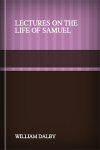
In these eight lectures, William Dalby examines the biblical account of Samuel, aiming to “exhibit its truths practically,” believing that teaching practical application to be both the most difficult and most important labor of a preacher. Dalby’s applications of Scripture to everyday life are eminently readable and enduringly valuable for those seeking to live under the authority of Scripture.
William Dalby was vicar of Warminster, prebendary of Sarum, and a tutor at Exeter College, Oxford.
This title is included in the following collections
You can save when you purchase this product as part of a collection.
Logos 8 Collector's Edition Le...
$11,399.99$11,399.99Logos 9 Collector's Edition Le...
$11,399.99$11,399.99Logos 8 Ultimate Legacy Librar...
$21,749.99$21,749.99Logos 9 Ultimate Legacy Librar...
$24,999.99$24,999.99
Reviews
1 rating

Pastor Julius A. Renwick, M.Div.
5/18/2016